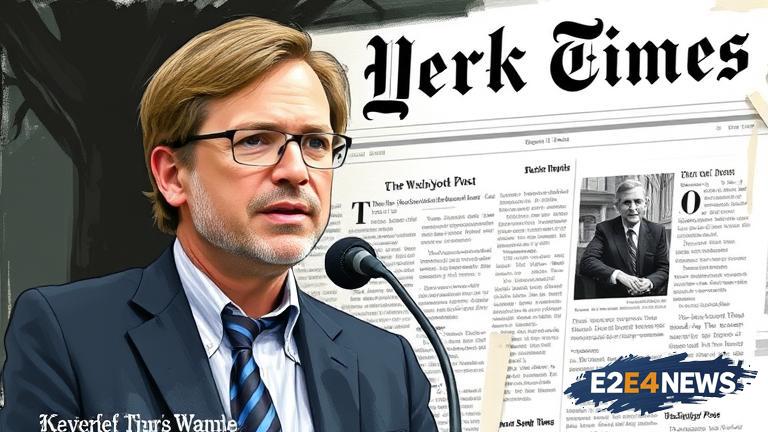Erik Wemple, a veteran journalist and media critic, has announced his departure from the Washington Post after accepting a buyout offer. Wemple, who has been a prominent figure in the media landscape, will be joining the New York Times, one of the most prestigious news organizations in the world. This move marks a significant shift in Wemple’s career, as he leaves behind a legacy of critically acclaimed work at the Washington Post. Wemple’s decision to accept the buyout was likely influenced by the changing media landscape and the need for news organizations to adapt to new realities. The Washington Post, like many other news outlets, has been undergoing significant changes in recent years, including staff reductions and shifts in editorial focus. Wemple’s departure is a significant loss for the Post, as he has been a key voice in the media criticism sphere. His work has been widely respected and admired, and his insights have helped shape the national conversation on media and journalism. At the New York Times, Wemple will be joining a team of esteemed journalists and media critics, and his expertise and experience will undoubtedly be a valuable asset. The New York Times has a long history of excellence in journalism, and Wemple’s addition to the team is a testament to the organization’s commitment to quality and integrity. Wemple’s move is also a reflection of the ongoing consolidation and evolution of the media industry, as news organizations seek to adapt to changing reader habits and technological advancements. The buyout offer accepted by Wemple is part of a larger trend of news organizations offering voluntary separation packages to employees, as a way to reduce costs and streamline operations. This trend has been observed across the industry, with many news outlets undergoing significant restructuring efforts. Despite the challenges facing the media industry, Wemple’s decision to join the New York Times is a vote of confidence in the future of journalism. The New York Times has been at the forefront of innovation and experimentation in the media space, and Wemple’s expertise will likely be an important contributor to these efforts. Wemple’s work at the Washington Post has been marked by a commitment to fairness, accuracy, and transparency, and these values will undoubtedly be an asset to the New York Times. As the media landscape continues to evolve, Wemple’s move to the New York Times is a reminder that quality journalism and media criticism are essential to a healthy democracy. The loss of Wemple’s voice at the Washington Post will be deeply felt, but his gain at the New York Times is a significant boon for the organization. Wemple’s career has been marked by a series of high-profile scoops and critically acclaimed pieces, and his work has been widely recognized and respected. His move to the New York Times is a testament to his enduring reputation as a leading voice in media criticism. The New York Times has a long history of attracting top talent, and Wemple’s addition to the team is a reflection of the organization’s commitment to excellence. As Wemple begins his new role at the New York Times, he will be joining a team of experienced journalists and media critics, and his expertise will undoubtedly be an important contributor to the organization’s ongoing efforts to innovate and adapt to changing reader habits. The media industry is undergoing significant changes, and Wemple’s move to the New York Times is a reflection of the ongoing evolution of the landscape. Despite the challenges facing the industry, Wemple’s decision to join the New York Times is a vote of confidence in the future of journalism, and his work will undoubtedly continue to shape the national conversation on media and journalism.





